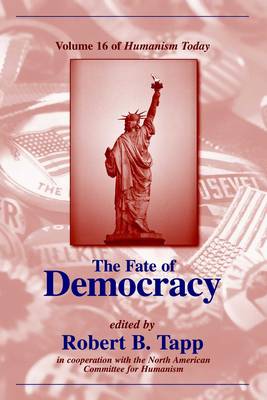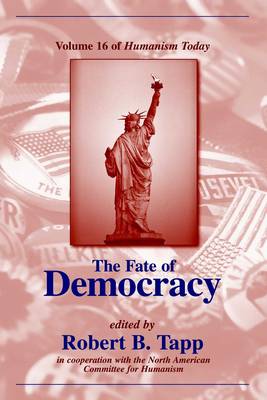
- Afhalen na 1 uur in een winkel met voorraad
- Gratis thuislevering in België vanaf € 30
- Ruim aanbod met 7 miljoen producten
- Afhalen na 1 uur in een winkel met voorraad
- Gratis thuislevering in België vanaf € 30
- Ruim aanbod met 7 miljoen producten
Omschrijving
Although some may argue that democracy is more widespread today than at any time in history, others point to the dangerous, irrational forces in both the West and the East that threaten the future of democratic government. The contributors to this volume of essays from The Humanist Institute all share this concern for the serious challenges that have recently arisen to confront the democratic way of life. They point to the strengthening of irrational belief systems within many of the world's religions, conservative trends both here and abroad that seem to favor a form of theocracy over secular democracy, and the weakening of traditional liberal ideals through the controversies surrounding postmodernism and multiculturalism.
In addition to these shared concerns, the contributors also share a commitment to the Enlightenment emphasis upon the powers of reason in free individuals. Central to the preservation of democracy is the rule of law, which depends upon an educated citizenry. One of the dangers today is that respect for Enlightenment ideals as well as the quality of education are being undercut.
Among the specific topics treated are individual rights and freedoms versus the need for security against terrorism, freedom of the press during a "War on Terrorism," and the importance of education to the future of democracy.
The contributors include Vern L. Bullough, Joseph Chuman, Carmela Epright, Kurt Johnson, Paul Kurtz, Sarah Oelberg, Howard Radest, Philip Regal, Andreas Rosenberg, Harvey Sarles, Robert Tapp, and Michael Werner.
In addition to these shared concerns, the contributors also share a commitment to the Enlightenment emphasis upon the powers of reason in free individuals. Central to the preservation of democracy is the rule of law, which depends upon an educated citizenry. One of the dangers today is that respect for Enlightenment ideals as well as the quality of education are being undercut.
Among the specific topics treated are individual rights and freedoms versus the need for security against terrorism, freedom of the press during a "War on Terrorism," and the importance of education to the future of democracy.
The contributors include Vern L. Bullough, Joseph Chuman, Carmela Epright, Kurt Johnson, Paul Kurtz, Sarah Oelberg, Howard Radest, Philip Regal, Andreas Rosenberg, Harvey Sarles, Robert Tapp, and Michael Werner.
Specificaties
Betrokkenen
- Uitgeverij:
Inhoud
- Aantal bladzijden:
- 240
- Taal:
- Engels
- Reeks:
Eigenschappen
- Productcode (EAN):
- 9781591023289
- Verschijningsdatum:
- 1/09/2005
- Uitvoering:
- Hardcover
- Formaat:
- Genaaid
- Afmetingen:
- 160 mm x 231 mm
- Gewicht:
- 476 g

Alleen bij Standaard Boekhandel
+ 96 punten op je klantenkaart van Standaard Boekhandel
Beoordelingen
We publiceren alleen reviews die voldoen aan de voorwaarden voor reviews. Bekijk onze voorwaarden voor reviews.









